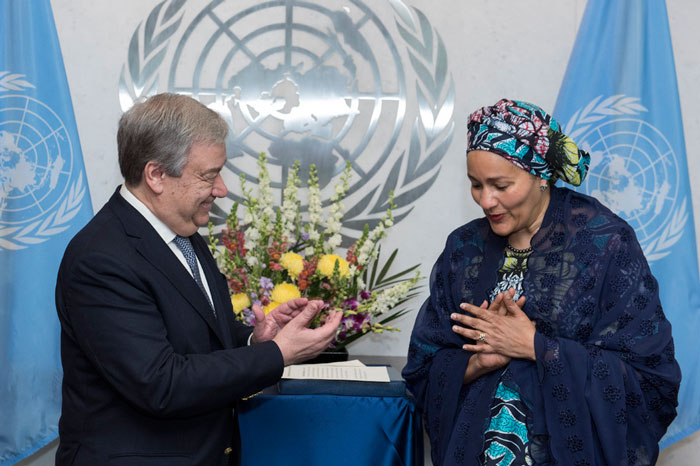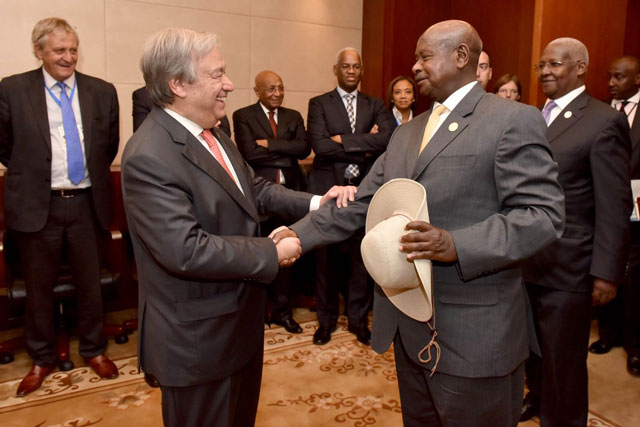
United Nations, United States | AFP |
UN Secretary-General Antonio Guterres will travel to Kenya on Sunday for talks with leaders on regional issues, his spokesman said Friday, as South Sudan and Somalia face famine.
Somalia is facing the threat of a famine while parts of northern South Sudan are already suffering from starvation.
Kenya is a key player in peace efforts in Somalia and has agreed to contribute troops to a new UN regional force for South Sudan.
Guterres, who took the UN helm in January, is pushing for a new strategy to end South Sudan’s three-year war.
Famine and instability has forced over a million refugees to flee north to Sudan, and south to Uganda.
Last month, United States gave over $25 million in humanitarian aid to Uganda, to help the nation cope with a huge influx of refugees fleeing conflict in east Africa.
Uganda is hosting more than a million refugees, nearly 700,000 of whom escaped the brutal civil war raging in neighbouring South Sudan since December 2013.
US ambassador Deborah Malac praised Uganda’s “very progressive policy” towards refugees.
“We applaud that the government is committed to keeping the door open to refugees,” she told reporters.
The $25.2 million (24 million euros) will be used to improve water and sanitation in refugee camps, fight gender-based violence and ensure ongoing protection.

UN Security Council visit to draw attention to Lake Chad crisis
UN Security Council envoys on Thursday travel to Africa’s Lake Chad region, where famine, the Boko Haram insurgency, climate change and poor governance have collided to create one of the world’s worst humanitarian crises.
The 15 ambassadors from the UN’s top decision-making body hope to draw global attention to the emergency affecting 21 million people across four countries: Nigeria, Chad, Cameroon and Niger.
The visit could also pave the way to stronger action by the Security Council to address what has been a largely ignored crisis, relegated to the bottom of the diplomatic agenda as war in Syria and South Sudan escalated.
British Ambassador Matthew Rycroft said the visit will “shine a spotlight of international attention on the humanitarian crisis” at a time when donors are asked to come up with new financing for the region.
The crisis has been “largely overlooked” and the Security Council was “perhaps a bit slow off the mark in tackling the threat of Boko Haram,” Rycroft told AFP.
Led by Britain, France and Senegal, the council will meet with leaders, talk to civil society groups and visit camps in Cameroon and northeast Nigeria sheltering some of the 2.3 million people displaced in the region.
The visit begins in Cameroon a week after UN Secretary General Antonio Guterres set off alarm bells over the threat of famine in northeast Nigeria, the epicenter of the Boko Haram conflict.
The United Nations is seeking $1.5 billion in funding for 2017 for the Lake Chad region — almost half of which is needed for northeast Nigeria, where 5.1 million people face acute food shortages.
– ‘Perfect storm’ of challenges –
Boko Haram took up arms in 2009 in pursuit of an Islamic state in northern Nigeria, but the insurgency has since spread with frequent suicide bomb attacks.
Africa’s second-largest oil producer, Nigeria has made inroads in its military campaign to root out the Islamists, but at a high price for civilians.
Last month, a Nigerian military jet accidentally bombed a camp for displaced people in Borno state, killing at least 112 civilians, including six Nigerian Red Cross workers, and wounding 100.
Compounding the crisis, climate change and population growth have turned Lake Chad — once one of Africa’s largest bodies of water — into an environmental disaster.
The lake’s water basin has shrunk to barely 10 per cent of its 1960s levels.
The ambassadors will encourage the four countries to come up with a new strategy to address the crisis and its many facets, French Ambassador Francois Delattre said.
Governments should “adopt a comprehensive approach to address the root causes of terrorism, including governance and development,” he said.
Sweden, a non-permanent council member and big humanitarian donor, hopes the council will be more active in tackling the crisis.
The Lake Chad region has been hit by a “perfect storm” of challenges, Swedish diplomat Carl Skau said: “terrorism, trafficking, serious underdevelopment, but also the effects of climate change.”
“This cannot be a one-off,” he added. “We need a serious follow-up when we come back.”
Fourteen countries pledged $672 million to the Lake Chad funding appeal at a donors’ conference in Oslo last week, a tally UN officials welcomed as a good start to the aid effort.
 The Independent Uganda: You get the Truth we Pay the Price
The Independent Uganda: You get the Truth we Pay the Price





